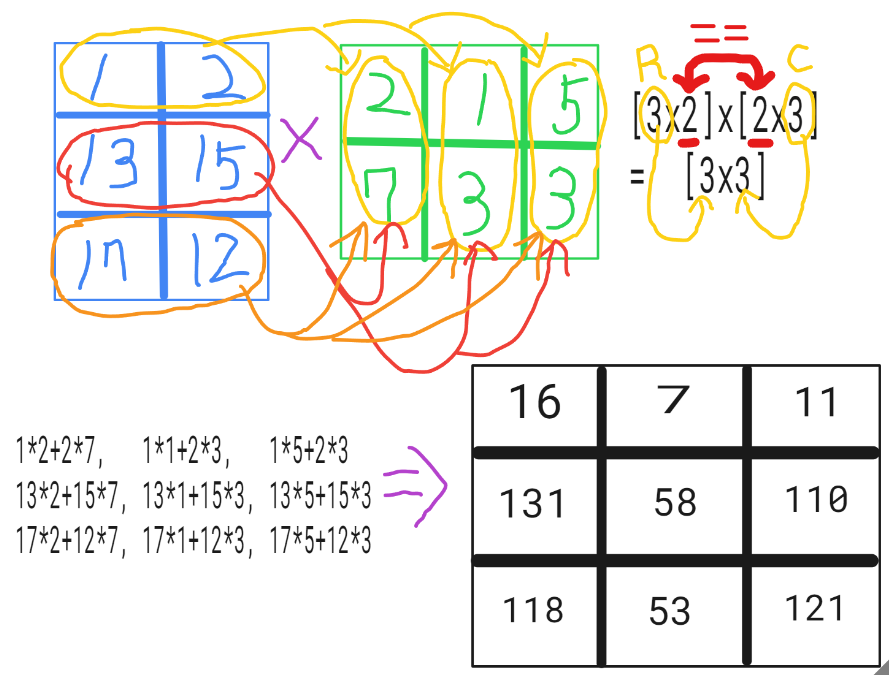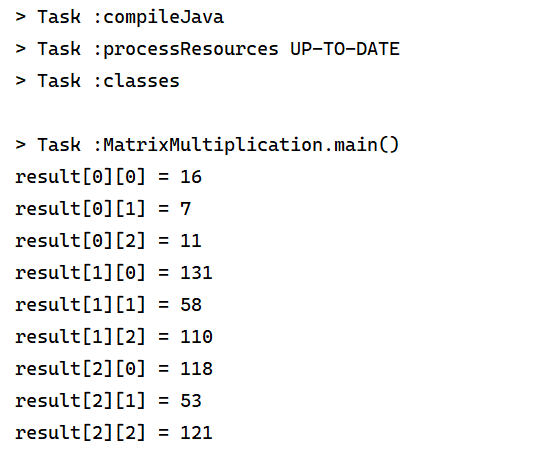Matrix Multiplication -> [2x4][3x1] = [2x1]
 Byung Joo Jeong
Byung Joo Jeong#What is the size of Array after operating Matrix Multiplication ?
#Forword
I don't know why i feel this, when i need to use Array in Java, I am confused how to use it.. This document also will handle the matrix multiplication, this document is also for my future use and used for organizing concepts. Surely, When I can't define something difficult, I am endeavoring to organize it, In doing so, I can understand how it works without realizing how can i understand this, I hope this works well !
#Matrix Multiplication

arr1[R1][C1] * arr2[R2][C2]
Requirement For this matrix multiplication.
when (C1 == R2), matrix multiplication can be operated.
First Matrix Column == Second Matrix Row
If (C1 == R2) {
arr1[R1][C1] * arr2[R2][C2] => resultArray[R1][C2]
}
more specified,
arr1[3][5] * arr2[2][1]
\==> Column of arr1 != Row of arr2
\==> This can't be Operated
arr1[2][4] * arr2[4][5]
\==> Column of arr1 == Row of arr2
\==> resultArr[2][5] (arr1 Row * arr2 Column)
#Code Snippets
public class MatrixMultiplication {
public static void main(String[] args) {
int[][] arr1 = {{1,2},{13,15},{17,12}};
int[][] arr2 = {{2,1,5},{7,3,3}};
if (arr1[0].length != arr2.length) {
System.out.println(
"Number of columns in the first matrix must be equal to"
+ " the number of rows in the second matrix "
+ "for matrix multiplication");
//if this condition is false => exit main method by using "return;" with error message.
return;
}
int[][] result = new int[arr1.length][arr2[0].length];
for (int i = 0; i < arr1.length; i++) {
for (int j = 0; j < arr2[0].length; j++) {
for (int k = 0; k < arr1[0].length; k++) {
result[i][j] += arr1[i][k] * arr2[k][j];
}
}
}
for (int i = 0; i < result.length; i++) {
for (int j = 0; j < result[0].length; j++) {
System.out.println("result[" + i + "][" + j + "] = "
+ result[i][j] + " ");
}
}
System.out.println();
}
}

cf) In Java, "return;"
When condition is 'false', it will exit the current method.
it's important to note that return; will only exit the current method, not the entire program.
Subscribe to my newsletter
Read articles from Byung Joo Jeong directly inside your inbox. Subscribe to the newsletter, and don't miss out.
Written by
